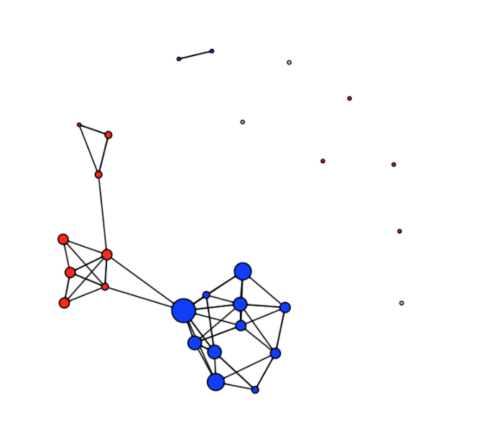April 9, 2021
Course Experience: Studying Social Network Analysis in the CSS programme
Social network analysis is currently a very popular field. The computational social science programme set this course specifically. And I will briefly share my course experience of learning Social Network Analysis at Linköping University.

First of all, let me introduce Social Network Analysis a little bit before talking about the course I’m taking. Social network analysis covers a wide range of topics. The CSS programme at Linköping University mainly focuses on the study of group behavior and social relations, and analysis of social phenomena, and social issues. For example, by investigating the informal interpersonal relationships among employees in a company, the company’s information flow, decision-making structure, and the health of the superior-subordinate relationship can be analyzed. The other typical study in this field is about the relationship of friends among students in a school, which could further explore the mechanism of race or gender segregation. Many issues involved in traditional quantitative research can also be studied from the perspective of “relationship networks”. Of course, one of the most popular topics is the analysis of online social networks (such as Facebook, Twitter, etc.). In recent years, many social events have been negatively affected by the spread of a large number of fake news on social media, and the use of social networks to analyze information dissemination has attracted much attention in various fields.
The Social Network Analysis course at LiU does not require much background in related fields, and you just need to have some basic quantitative research knowledge. The initial stage of the course mainly involves the introduction of basic social network concepts, such as nodes, degrees, small-world phenomena, and the theory of six degrees of separation. In the second half of the course, the knowledge span will be relatively large, involving more complex social network models, such as the exponential random graph model, which will play an important role in further understanding the social structure and network processes.


Of course, research on “relationship networks” requires specific social network analysis tools. Although social network analysis itself has a lot of software, such as Ucinet, Gephi, Visone, etc., the CSS programme mainly uses the R language, so this course also uses the same programming language.
In addition, the question that everyone may be concerned about is, how intensive and difficult is this course? I personally feel that the course schedule is relatively intensive. In addition to a two-hour lecture per week to learn theoretical knowledge, there will also be a two-hour lab to learn the practical methods of the R language, and a two-hour seminar to discuss related papers. At the weekly seminar, the designated group needs to present PPT, introduce the content of the paper, and host class discussions. In short, you need to invest a certain amount of time every week to review the content of the course, participate in group discussions, and complete the content of homework. Of course, teachers and teaching assistants will still adjust the content of the coursework considering the situation of the students, so there is no need to worry too much.
But if you want to know more about this course or have any questions about the computational social science programme, feel free to leave a comment!



